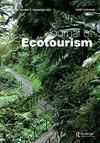Extended reality and sustainable tourism: restorying human–wildlife relationships for biocultural conservation
IF 2.4
Q2 HOSPITALITY, LEISURE, SPORT & TOURISM
引用次数: 4
Abstract
ABSTRACT Through a critical pedagogical framework, global conservation initiatives are integrated to curate a transformational extended reality (XR) curriculum in nature-based tourism (NBT). This proposed design affects visitors’ protected area experience and supports human–wildlife relationships through XR exposure (before), peak NBT experiences (during), and post-experience reflections (after). The authors’ XR design entitled Knowing Wolves (KW) is inspired by Colorado’s publicly approved Gray Wolf reintroduction legislation and reorients the visitor experiencescape as a conduit for wildlife agency after exposure to critical thinking engagement for biocultural conservation. The authors analyze four international initiatives featuring human–wildlife criteria including the United Nations Sustainable Development Goals, the Global Sustainable Tourism Criteria, the Convention on Biological Diversity post-2020 Global Biodiversity Framework, and the Convention on International Trade in Endangered Species. The XR curriculum challenges practices of colonial conservation, integrates environmental intersectionality and critical inquiry to support engagement with posthumanism philosophy and agency of oppressed groups.扩展现实与可持续旅游:为生物文化保护恢复人类与野生动物的关系
通过一个关键的教学框架,全球保护倡议被整合到以自然为基础的旅游(NBT)的转型扩展现实(XR)课程中。这个提议的设计影响了游客的保护区体验,并通过XR曝光(之前)、高峰NBT体验(期间)和体验后反思(之后)来支持人类与野生动物的关系。作者的XR设计名为“认识狼”(KW),其灵感来自科罗拉多州公开批准的灰狼重新引入立法,并将游客体验重新定位为野生动物机构在接触批判性思维参与生物文化保护后的渠道。作者分析了包括联合国可持续发展目标、全球可持续旅游标准、《生物多样性公约2020年后全球生物多样性框架》和《濒危物种国际贸易公约》在内的四项以人类与野生动物标准为特征的国际倡议。XR课程挑战了殖民保护的实践,整合了环境交叉性和批判性探究,以支持与后人文主义哲学和被压迫群体代理的接触。
本文章由计算机程序翻译,如有差异,请以英文原文为准。
求助全文
约1分钟内获得全文
求助全文
来源期刊

Journal of Ecotourism
Social Sciences-Geography, Planning and Development
CiteScore
6.40
自引率
12.50%
发文量
32
期刊介绍:
The Journal of Ecotourism seeks to advance the field by examining the social, economic, and ecological aspects of ecotourism at a number of scales, and including regions from around the world. Journal of Ecotourism welcomes conceptual, theoretical, and empirical research, particularly where it contributes to the dissemination of new ideas and models of ecotourism planning, development, management, and good practice. While the focus of the journal rests on a type of tourism based principally on natural history - along with other associated features of the man-land nexus - it will consider papers which investigate ecotourism as part of a broader nature based tourism, as well as those works which compare or contrast ecotourism/ists with other forms of tourism/ists.
 求助内容:
求助内容: 应助结果提醒方式:
应助结果提醒方式:


